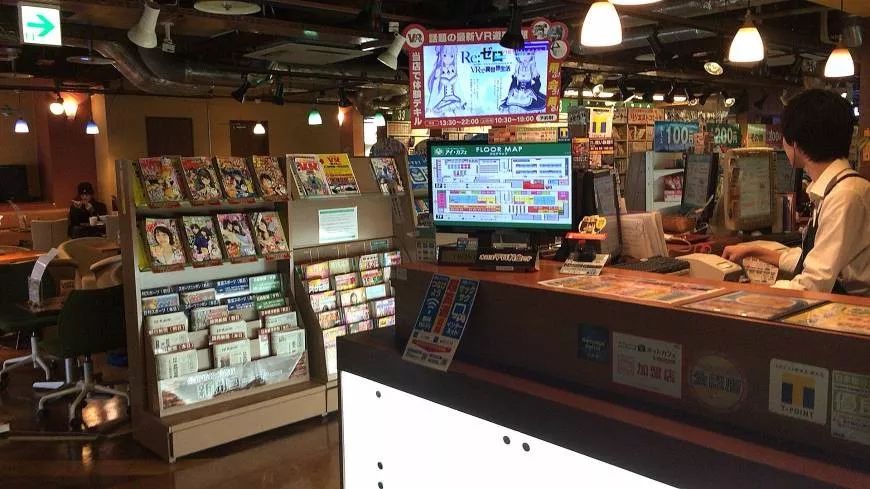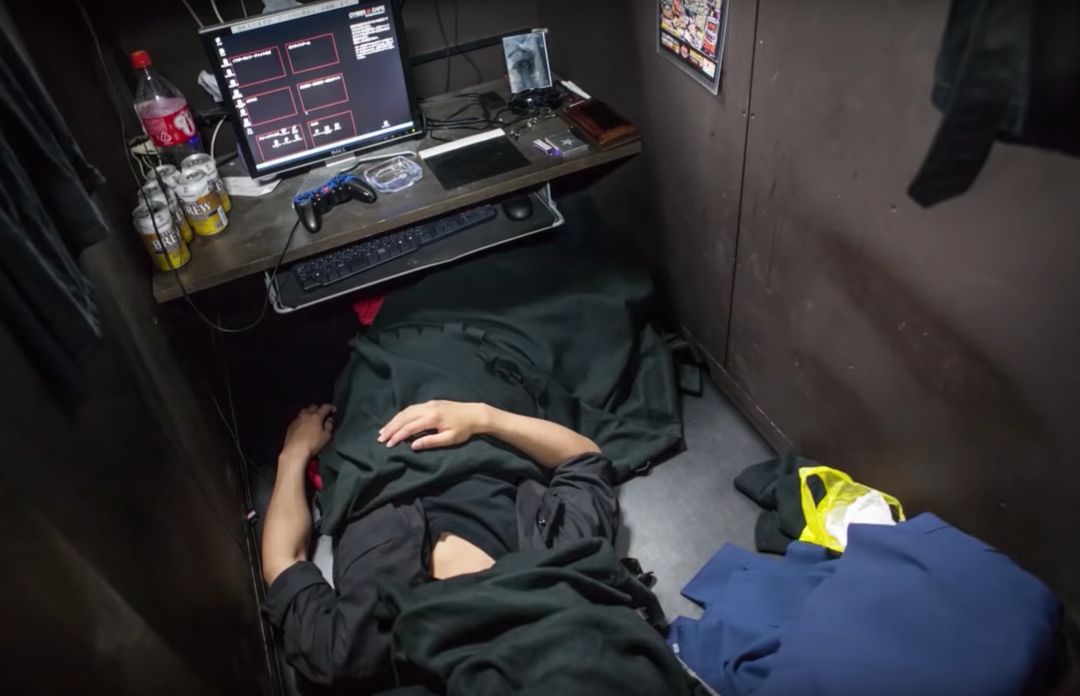After living in an Internet cafe for two years, he decided to get his life back.
Original: Bund Jun Bund TheBund
In Tokyo, 4000 people live in Internet cafes every day.
They are called "Internet cafe refugees"

If you travel freely to Japan and stay in a city for a day without booking a hotel room, many travel guides will tell you that Japanese Internet cafes are a good place to spend the night.
Compared with the Internet cafes in China, Japanese Internet cafes are more "multi-functional", with private single compartments, simple beds and blankets, all kinds of food and drinks, brushing your teeth and taking a hot bath, and more importantly, the price is quite cheap, with the price of one night included as long as about 2,000 yen.
This has also attracted the curiosity of many foreign netizens. Even recently, on Youtube and other video platforms, there has been an upsurge of going to Japanese Internet cafes to experience life and shoot Vlog.

Foreigners are full of curiosity about Japanese Internet cafes and admire that it is a "paradise for otaku". But for some Japanese, it is a dark world full of depression and loneliness.
These people have no home and have to live in internet cafes every day because of life. They are called "Internet cafe refugees".

Get the number at the front desk, walk into your own single compartment, close the door, turn on the computer and sit on the floor. It becomes an isolated little world.
Hungry? Click the mouse and all kinds of fast food fried rice will be delivered to you.

When you are thirsty, you can find vending machines everywhere, and the types of drinks are comparable to any convenience store.

At bedtime, there is a separate bathroom at the end of the corridor.

Take off makeup, brush your teeth, take a shower, blow dry your hair, go back to the cubicle and sleep together, and spend the whole night on the folding mat.
This way of life, once in a while, has a different taste, but it is torture every day.
It is unimaginable that tens of thousands of people in Japan are experiencing this life every day.
Since the late 1990s, similar inter-grid Internet cafes have sprung up in Japan. After 2000, "Internet cafe refugees" became a hot topic in Japan.

In 2007, the first statistics of Japanese government departments found that on average, more than 60,000 people spent the night in Internet cafes in Japan, of which 5,400 were "permanent residents".
Due to the weak economic situation in Japan, this figure has been on the rise in the past decade. In a recent survey, the number of "Internet cafe refugees" in Tokyo alone reached 4,000.
01
A refuge for people who are afraid of society
These "Internet cafe refugees" live here for various reasons. Some are young people who have just come to big cities to seek gold, some are middle-aged people who have been laid off by their companies for over half a year, and many people can’t integrate into society because of personality problems, so they can only choose to settle down in Internet cafes.

These Internet cafes meet all the basic needs of the "home". When one door is closed, there is no need to deal with others, and there is a network that can contact the outside world with a virtual identity. Therefore, these cubicles have become the best refuge for Japanese social terrorists.
Most of these people, at first, just held the idea of a short stay in the Internet cafe, but in the end they stayed week after week, month after month, and they could never get back to their normal lives.
Masada, a 39-year-old programmer, lived in Manboo Internet Cafe in Tokyo for two years, and his daily work was also done on the computer in the Internet Cafe.

"The living environment here is actually not ideal. The room is not completely private. The walls of the compartment are not connected to the ceiling. People next door can see what you are doing without standing on tiptoe." Masada said that he could vaguely hear the voices of people talking and snoring next to him.
Masada used to rent a house, but many daily chores drove him crazy. He was afraid of contact with others and didn’t get along well with his neighbors. Finally, he simply escaped and lived in an Internet cafe.
"I don’t like the feeling of being bound, I don’t like being trapped in one place and living a free life."

In the Internet cafe, Masada didn’t have to worry about being disturbed by others, and she hardly went out every day. She slept when she was sleepy, surfed the Internet and worked when she woke up, and ate instant noodles when she was hungry, so she lived for two years.
"In the countryside, people are very enthusiastic. Tokyo is different. People don’t care about you. They only care about themselves."
Masada said that he often asks himself, do you really want to live like this all your life? On the occasion of the second anniversary of Manboo Internet Cafe, Masada finally made up his mind to leave the Internet Cafe.
"No one can live entirely on their own, and they still have to communicate with the outside world. It’s a good place to stay, but it’s impossible to stay forever. Still want to force yourself to go out and accept this new world. “

02
I feel at ease when I feel someone next door.
There are thousands of Internet cafes like Manboo all over Japan. In addition to severe social phobia patients like Masada, there are also many people who have lost their life goals.
Xiao Tong, a 23-year-old nightclub girl, lived in Manboo for two months.

"I hate loneliness, but I want to have my own independent space. This is actually very contradictory, but I found a balance in the Internet cafe. This is a private room, but you can feel that there are people next door at any time, which makes me feel at ease. "
When Xiaoyan was 16 years old, her parents kicked her out of the house on the grounds that she was an adult. "They care more about my brothers and sisters and let me die."
Due to her livelihood, Xiaoyan got a job as a hostess in a nightclub in Tokyo. Go out at night every day, sleep in the internet cafe cubicle during the day, go out to work when it is dark, and come back with fatigue in the early morning.
"My health has always been bad. At that time, I hoped to live to be 20 years old. But after this age, I am still a little lost. "
Xiaoyan said that she has no goal and can’t find a reason to live. She can only let life take her forward.
"I don’t have your so-called dream. I don’t even know where I will be a year from now, but I will be a little happier."
Xiaoyan didn’t give up life completely, but tried to find her own position in this city. "If I really want to say it, I think it’s not bad to be a serious masseur. I’m willing to learn skills."
03
Temporary workers marginalized by Japanese society
In addition to social fear and other psychological problems being marginalized by society, another culprit that drives people into Internet cafes as refugees is Japan’s informal employment system.
In the Japanese workplace, about one-third of people are employed informally, that is, we often see dispatched members or contract members in Japanese dramas. Compared with the regular employees of the same company, their income is only half, and there is no welfare, so the income of amateurs is not enough to give them the right to enjoy social relief.

The cost of living in Tokyo is so high that it is not easy to find a place to live here. According to statistics, 58% of the "Internet cafe refugees" in Japan are informal employees.
In 2015, Japanese photographer Tomita Zhisui filmed a series of documentary short films "One-off Workers in Japan", one of which was named "Internet Cafe Refugees", and won the third prize of the long-form category of the Jose Award. This short film records the true story of being forced to live in an Internet cafe because he can’t integrate into the workplace.
Wen, 26, also worked as a security guard on a construction site. At first, he looked for an apartment for a long time, but finally he gave up because he couldn’t afford it and lived in an Internet cafe.

"I often go to Internet cafes at ordinary times, so there is not so much resistance. But I still couldn’t sleep on the first night. From time to time, I was awakened by noise such as washing dishes outside, and people were very upset. "
Wenye’s income is enough to meet the living expenses in the Internet cafe. Here, the equipment is complete, and the electricity and network fees are all inclusive. It doesn’t cost too much. "But even if you want to save money, you can’t save it at all."
Although he has lived in an Internet cafe for 22 months, Wen has never given up on himself and is always working hard to become a full-time employee.
"How to say, also can’t always play temporary workers like this. So I will improve my skills from now on. I am still young and can always be a regular employee. "
04
The destination of office workers after fleeing from the workplace

Another story in the short film tells Wen that the reality may be more cruel than he thought, because even if he becomes a regular employee, he will face another level of high-intensity work pressure and endless workplace bullying.
Sakai, the protagonist of this story, is 42 years old. He worked in a credit card company for 20 years before living in an Internet cafe.
"There are 120-200 hours of overtime every month, and the content of the work is computer management and the like. I don’t have time to go home at all. I often take a nap in the company and then go to work. After waking up, I can’t tell whether it is day or night. "

Over time, Sakai’s mental state had some problems, and people around him began to complain that he was grumpy and always absent-minded, and he didn’t notice it himself. After seeing a doctor, he was diagnosed with depression.
"I took a month’s sick leave with the company, and when I came back, I found someone gossiping in front of the leader and saying,’ This guy is just too weak’ and so on."

Since then, Sakai’s salary has never risen, and the leader has stopped talking to him.
"The moment I handed in my resignation letter, it was so refreshing!" After resigning, Sakai went out to play for three months, thinking only of a new life and a happy life.
"I definitely don’t want to be an office worker anymore. I want to live in a completely different country for two or three years. This is my dream."
However, when I said this sentence, Sakai had lived in an Internet cafe for four months.

The stories of these "Internet cafe refugees" are somewhat depressing, because they have stepped into the quagmire on the edge of society for various reasons, and it is difficult to pull away.
But despite this, each of them still has hope for life. Whether they have lived in an Internet cafe for two months or two years, they are willing to stop their gloomy life and find a new direction in life. This is still very commendable.
So look at the bitterness that these people say with a smile. We should cherish the life we have now, shouldn’t we?
Text/Bund Jun
Image from:
Residents living permanently in Japan’scyber-cafés – Lost in Manboo
Tomita-One-off Workers in Japan: Internet Cafe Refugees
Feel Fukuoka Japan -"futaba@cafe"
Original title: After living in an Internet cafe for two years, he decided to get his life back.
Read the original text